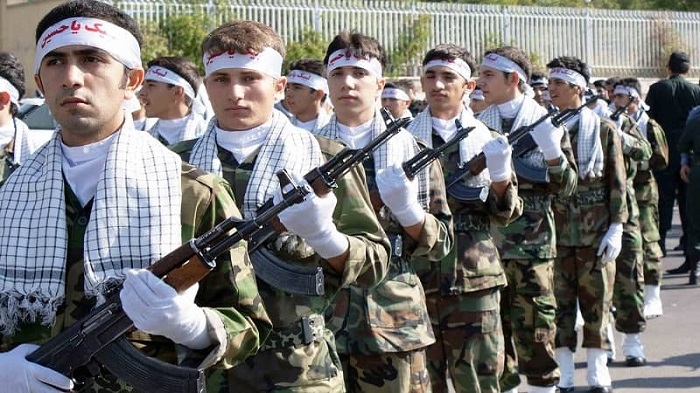
In recent weeks, a heightened number of meetings between Iranian state officials and military personnel, especially the Basij forces, has grabbed attention.
The website Basij.ir confirms these engagements. But the cause isn’t the state’s increasing empathy for the disillusioned public. Instead, it marks the first anniversary of the uprising triggered by Mahsa Amini’s death on September 16, an event that continues to destabilize the regime.
Hassan Hassan-Zadeh, the Islamic Revolutionary Guard Corps (IRGC) commander for Tehran Province, voiced his concerns at a Basij commanders’ assembly on August 8. He stressed, “If it weren’t for our focus on neighborhood-based security last year, Tehran would have fallen victim to our enemies. This isn’t just about missile development; it’s about building strong foundations.”
IRGC commander for Kohgiluyeh and Boyer-Ahmad Province, Hamid Khodamdel, also sounded an alarm. He remarked on August 10, “The battle we face is rooted in determination and principles. It’s beyond traditional warfare equipment like missiles, cannons, and tanks. Our homes are the new battlegrounds.”
The regime’s nuclear and missile capabilities seem redundant against this internal threat. Supreme Leader Ali Khamenei believes that the Basij’s mobilization in the country’s nooks and corners is pivotal to addressing this issue.

These declarations reflect the deep anxiety and unease of state officials about a grassroots momentum challenging the clerical regime’s very survival.
The Basij, established during the Iran-Iraq war, aimed to solidify the regime’s power and quash opposition. Although perceived as the “mobilization” force championing the regime’s ideology, it often draws members using economic lures due to Iran’s rampant poverty, making the Basij more about economic coercion than ideological purity. Their omnipresence in various sectors empowers the regime’s security framework, suppressing protests and executing surveillance.
Hossein Salami, IRGC’s Commander-in-Chief, accentuated the regime’s vulnerability during an August 1 meeting with Basij commanders, advising, “Keep your local Basij bases alert! Amplify the Islamic neighborhoods! Ensure they remain vibrant.” He further warned of the fragility of the regime’s security apparatus, suggesting that even minor vulnerabilities could lead to catastrophic breaches.
#IranProtests2022: Brutal suppression of the protesters by the regime’s Revolutionary Guards (IRGC), paramilitary Basij, State Security Forces (SSF), and plainclothes agents. #Iran #MahsaAmini #IranRevolution pic.twitter.com/N2tHsCM3nF
— NCRI-FAC (@iran_policy) September 28, 2022
Iranian opposition President-elect Maryam Rajavi of the National Council of Resistance of Iran (NCRI), pointed out the regime’s evident distress. In a speech at the Free Iran World Summit on July 1, she asked, “With an army comprising the Revolutionary Guards, Basij militia, and covert agents, why does the regime fear internal resistance cells? Could it be the potential for more uprisings? Why ask global governments to pressurize the Iranian Resistance? Because they hear the imminent echoes of rebellion and a possible democratic shift.”
MEK Iran (follow us on Twitter and Facebook), Maryam Rajavi’s on her site, Twitter & Facebook, NCRI (Twitter & Facebook), and People’s Mojahedin Organization of Iran – MEK IRAN – YouTu

